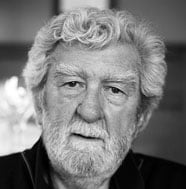She's not angry exactly but all business, eating them right off the tree, with confidence, the kind that lets her spit out the bad ones clear of the sidewalk into the street. It's sunny, though who can tell what she's tasting, rowan or one of the serviceberries— the animal at work, so everybody, save the traffic, keeps a distance. She's picking clean what the birds have left, and even, in her hurry, a few dark leaves. In the air the dusting of exhaust that still turns pennies green, the way the cloudy surfaces of things obscure their differences, like the mock orange or the apple rose that cracks the paving stone, rooted in the plaza. No one will say your name, and when you come to the door no one will know you, a parable of the afterlife on earth. Poor grapes, poor crabs, wild black cherry trees, on which some forty-six or so species of birds have fed, some boy's dead weight or the tragic summer lightning killing the seed, how boyish now that hunger to bring those branches down to scale, to eat of that which otherwise was waste, how natural this woman eating berries, how alone.
Credit
From The Marriage in the Trees by Stanley Plumly. Copyright © 1997 by Stanley Plumly. Reprinted by permission of The Ecco Press.
Date Published
01/01/1997

